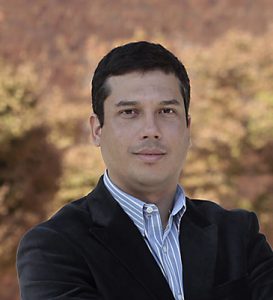“If the world of meetings, incentives, conferences and fairs, better known by its acronym MICE ( Meetings, Incentives, Conferences and Exhibitions) was already a challenge for insurers due to its dynamic and changing profile, The pandemic has set foot on the accelerator to cover one of the sectors most affected by the pandemic.
Elie Azancot, CEO at Riskmedia, has collaborated in this interview for the digital media puntomice.com in which he explains to us what is the current role of the world of insurance companies at the moment”

Insurance companies have a very important role to play in a time of uncertainty, unforeseen costs and the need for guarantees.
According to a survey conducted by AON internationally, with results presented four months ago, 82% of its customers did not consider before Covid-19 that a pandemic was one of the greatest risks that their company could face. In fact, in 2019 the possibility of a pandemic ranked 60th out of 69 identified risks. Only 30% of the entities consulted in Europe and America had a contingency plan in case of public health problem.
This reality is behind the difficulties that many companies encountered in coping with a response that demanded to be quick, effective and, above all, safe for those affected. Also, that currently the same insurer confirms that 80% have worked on incident management during the months of less activity integrating different areas such as Risks, Human Resources, IT (Information Technology) and Finance in the preparation of contingency plans.
However, there is another reality that is of great concern to the organizers of congresses, conventions, and events. Who is responsible for the costs of cancellation costs incurred by suppliers when a transaction is cancelled?
Many insurance companies still do not accept that these contingencies are assumed by their entity. And many organizers do not encourage their clients to make programs in this time of uncertainty, mainly due to the lack of confidence in this eventuality.
When the organizer does not feel safe, it is very difficult for the end customer to take risks at this time that can greatly alter the budget initially foreseen.
A necessary union
It is imperative that insurers and companies organizing congresses, conventions and events find a path of understanding since, as is well stated from the insurance sector, it is essential to feel well covered to be able to resume economic activity. But the breadth of coverage must be very broad for trust to be so to the same extent.
On the part of the insurance companies there seems to be no problem in increasing the coverage, although at a higher cost since the risk of incidence has multiplied exponentially: there is no longer only the possibility, more real than ever, than a flight being delayed or a delegate catching it. Also that the suppliers cannot assume certain benefits because they have not received certain materials or products, that the attendance of the event should be modified by last-minute restrictions…
It should not be forgotten that the insurance sector itself is a sector that is in crisis because of the economic recession and its consequences on recruitment. However, as stated in an event organized around the subject by Sabadell Bank and La Vanguardia, in the case of Spain «in 2020, and despite the fall in activity, the insurance sector has been able to maintain its levels of profitability and high solvency».
At the same session of Dialogos del Futuro, the representatives of the companies agreed in stating that «the risk of pandemic is especially excluded from the policies because it is impossible to quantify, and therefore, to rate, the necessary services».
All in all, there are so many possibilities today that a MICE operation will be affected by the Covid-19, that absolute peace of mind does not even pass for contracting much more expensive policies.
It is the insurance companies, so necessary in the reactivation of the economy and travel, who must propose coverage that adapts to the current situation. As Javier Rodríguez, head of Vida and member of the steering committee of Zurich Spain, said, «the Insurance Compensation Consortium does not respond to the risks of pandemic, so it is clear that after what happened we need to equip ourselves with the necessary tools to face that risk».
Communication between insurers and potential victims is more necessary than ever. Those behind the congresses, conventions, events and incentive trips have a moral and economic responsibility for the people involved in the operations and the companies that hire them that cannot, under any circumstances, risk the lack of protection. It is the turn of the insurers to offer those guarantees that bring peace of mind to the takeoff.
THE VOICE OF INSURANCE COMPANIES
MANUEL LÓPEZ
CEO InterMundial Group

“With a single insurance the traveller can meet the requirements of entry into the destination without giving up the coverage necessary for its protection”
How can insurers stimulate the recovery of the MICE industry?
We are already working closely with the industry to offer the necessary guarantees to restore the confidence of travellers. Through specific solutions for Congress Tourism and Incentives, we adapt to your particular needs, both in terms of health care at destination and its consequences, as in the recovery of the money before the trip and easy access to the tests with the obtaining of a document approved by the authorities of entry to the country.
What standard protection do they offer in the event of a pandemic?
We have adapted our products to add the most complete Covid-19 coverage to all InterMundial insurance. In addition, we have launched Health Passport, the only insurance on the market that covers the costs of carrying out the coronavirus diagnostic test before the start of the trip. In this way, with a single insurance, the traveller can meet the requirements of entry into the destination without renouncing the necessary coverage for their protection, such as medical assistance or extension of stay in the hotel by medical quarantine. In case of a positive result, if the traveller has taken out the insurance with cancellation guarantee, he can also recover the cancellation fees. And if the test is negative, you will have a certificate that will allow you to meet the entry requirements requested at the destination.
Have they created any specific insurance for cases of event cancellations, contagion, border closures… that generate more fear in companies?
We have a specific product segmented by event typology, destination and coverage needs. All our insurances have total flexibility in their hiring, so we offer a tailor-made solution including the most complete and quality medical assistance, extension of stay by contagion, luggage guarantee and loss of services… until possible cancellation by positive at Covid-19 or a Liability Insurance
Elie Azancot – CEO RISKMEDIA

“Today, infectious disease coverage is only granted on a case-by-case basis, and exceptionally for events”
How can insurers stimulate the recovery of the MICE industry?
Insurers can contribute to the recovery of the industry by providing full event cancellation coverage that includes all direct and indirect contingencies caused by Covid-19. However, the losses accumulated so far in this market niche do not allow us, nor even advise, to offer large capacities in this regard.
What standard protection do they offer in the event of a pandemic?
As a standard, only the effects of Covid-19 contagion on policies and travel assistance are usually covered in terms of the costs of overseas healing that may be incurred by the insured person’s health status. This in case the disease is contracted during the trip.
Have you created any specific insurance for event cancellations, contagion, border closures… that are based on the fear of companies when it comes to resuming travel arrangements?
The product is the one that already existed and had an optional extension to have health coverage in case of contagious diseases. It is part of our insurance «Cancellation for any cause» which includes the Extension for cases of adverse weather; Extension before the absence of artists or lecturers; Extension before political risks and Extension for coverage in cases of being affected by a terrorist attack. Health risk is part of our insurance for agencies and promoters, artists and event managers in general. Today, what we call Extension coverage for infectious diseases is only granted on a case-by-case basis, and quite exceptionally in the case of events.
Oscar Pineda – Technical Director from “No Vida” (MAPFRE MÉXICO)

“In the case of the MICE industry, insurance will become essential to recover business”
How can insurers stimulate the recovery of the MICE industry?
The insurance sector and the economy have a strong link in which insurance plays a key role in enabling losses to be compensated with hedges that provide protection against unexpected events. In the case of the MICE industry, damage insurance, accident coverage, liability and passenger protection will become essential to give continuity to business.
What standard protection do they offer in the event of a pandemic?Being a case that we consider as a disease, MAPFRE offers different alternatives through our different Medical Expenses Major products, covering the hospital expenses and medical fees that the traveler may incur. It is important that in each case you approach one of our allies to find the best alternative that suits your needs.
Have you created any specific insurance for event cancellations, contagion, border closures… that are based on the fear of companies when it comes to resuming travel arrangements?
There are travel and cancellation insurance, which provides claims protection for each destination and type of travel, as well as the necessary coverage for the possible cancellation of a trip or an event, covering non-recoverable expenses by the insured. At MAPFRE we have “Segurviaje”, a product designed for travelers that provides the necessary protection to the insured in case of emergency, considering that who is outside their country of origin or residence for business or training reasons. This insurance can be contracted by the organizer individually or collectively, having with it the peace of mind that the participants who are moving are protected.
Cristian Pérez – COO Econgress (Chile)

“Coverage on possible economic losses in events is needed»
How can insurers stimulate the recovery of the MICE industry?
In times of uncertainty such as those we are currently experiencing, it is very necessary to consider additional health coverage that may cover effects or consequences of possible contagion during the trip. In relation to corporate, associative and trade fair events, coverage is necessary on the possible economic losses that may derive from an event in the performance of these activities. As a result, the organisers would feel a certain level of assurance in confirming the completion of their activity and would not postpone or suspend, as was the case with more than 75 per cent of them at the beginning of the pandemic last year.
What aspects do you find more difficult to accept from your client companies?
In reality, recovery depends more on the health environment and the reality we live in. At present the interactions are virtual and little by little we will have to migrate to a hybrid scenario, to the extent that the conditions and confinements of the participants allow it. At the corporate level, companies have made a significant reduction in their budgets for travel and events, and many of them have said they will maintain it after the pandemic. As for the associative sector, the extension of restrictions and quarantines have turned these events into 100% virtual formats and, in very few cases, hybrids.
How do you perceive the sector’s recovery?
It is clear that the pace of recovery will be linked to the speed of vaccination and the effectiveness of destinations in ensuring health security and the protection of the passengers they expect to receive. We expect a revival of the main destinations in Latin America by the middle of the second half of this year and more massively by the beginning of 2022. The development of incentive trips will be in line with this perception.
Sara Vicioso – Manager from Travel Department El Corte Ingles Group (Perú)

“The cost of antigen or PCR testing included in the insurances would contribute to recovery“
How can insurers stimulate the recovery of the MICE industry
Expanding their policies and preferably including, in all of them, Covid-19 coverage with hospitalization until recovery. If not, cover at least the 14 days of quarantine that apply in many destinations. It would also contribute to recovery if the cost of antigen or PCR testing were to be borne by the insurance company before and after the trip, and this whenever necessary. Basically, it is a matter of having new alternatives available to suit current needs
of this new era.
What aspects do you find more difficult to accept from your client companies?
Accepting suppliers that can not provide security seals, since security is prioritizing other factors such as price, location, category of the property… Corporate event contractors are primarily responsible for the safety of their employees. It is difficult to accept the terms of employment on many occasions, as they should be based on much more flexible and non-payment policies in certain circumstances and allow for last-minute modifications.
How do you perceive the sector’s recovery?
It will depend a lot on the sector/activity to which they belong and type of event; the most massive congresses and fairs have been somewhat more affected than incentives, conventions, product presentations, sporting events… Progress in the vaccination system will greatly expedite recovery. The groups will be reduced in terms of number of people in order to be able to adapt to the limitation of capacity in the establishments. We assist in the development of new hybrid events including box lunch at home, incentives for couples programmed to measure, experience packages for individual use… This means that those who travel enjoy the trip or experience that the company offers, but in a more individual and safer way.
Paula Fuster – MICE Manager from Atlanta Events & Corporate Travel Consultant (Spain)

“Concerns about the costs that can be incurred with suppliers in the event of cancellation”
How can insurers stimulate the recovery of the MICE industry?
The traveler must have the security and guarantee that he is covered before any problem derived from the Covid-19, be it assistance, health, repatriation… and a change in the conditions for travel to the destination after contracting the journey.
What aspects do you find more difficult to accept from your client companies?
I see three: not being sure that the health of the participants in their events is preserved; they worry about the expenses they can incur with the providers in case of cancelling the event and, finally, the failure to obtain reimbursement of payments made for services that, for reasons beyond the control of customers as a result of the pandemic, they have to be cancelled.
How do you perceive the sector’s recovery?
In the short term, without vaccination, health passport or institutional support, it is very difficult to organize events because the moral and economic responsibilities are very high. If vaccination is available and mobility restrictions are maintained, the multi-site option becomes stronger, as each of them can provide security guarantees depending on the country. In the medium term, with vaccination and health passport as a basis, the participation in person will gradually and slowly increase, bearing in mind that a budget so far not included will have to be provided for anti-VOC-19 measures. Incentive trips will go to places that are perceived as «safe» by the involvement of their authorities and social agents in preserving tourism (vaccinations, sanitary facilities, certificates, health passports…). We believe that we will opt for low-density destinations and programmes with activities that avoid as much as possible contagion. Full recovery will come when everyone is vaccinated. It would greatly help to support the promotion, economic and health measures of institutions and to safeguard investment if health conditions change.
By Eva López Alvárez